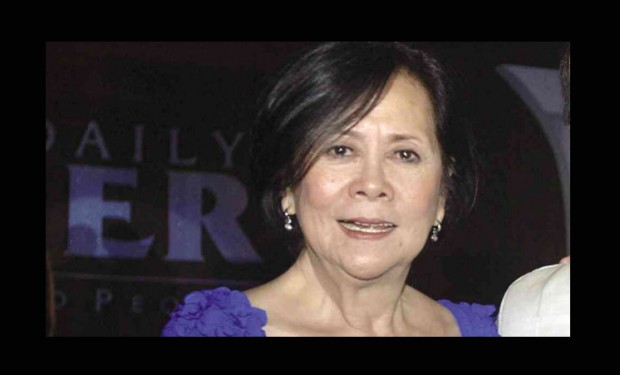‘Once an Inquirer, always an Inquirer’
LOS ANGELES—I was enjoying a rare, celestial display of a full moon on Christmas Eve, the second day of winter in America, when I learned that my former boss, Letty Jimenez-Magsanoc, had died in Manila. Suddenly, the freezing California night air felt like a furnace in my face as a deep, enveloping sadness crept over me.
Memories brought me back to the night of Oct. 8, 2014, when Tita Letty ushered me into her office at the Inquirer building in Makati City. It became my last meeting with the fearless editor in chief who, with her crack team of editors, had molded me and whipped me into some form as a startup cub reporter for the Inquirer in the late 1980s.
“Once an Inquirer, always an Inquirer,” she teased me, displaying her masterful way with words. The meeting that October evening was also her way of welcoming me back after my having been away for 21 years from the Inquirer, the newspaper I abandoned in December of 1991 for a life of uncertain exile in America to escape death threats and libel suits.
Homecoming
That night, I felt like the prodigal son, remorseful but thankful for the chance to return and come home to a place that was so good to me.
Article continues after this advertisementThe unimaginable human misery brought about by Supertyphoon “Yolanda” (international name: Haiyan) to my hometown of Palo and province of Leyte in November 2013 had forced me to return to my homeland, even if only to help chronicle the disaster for the Inquirer.
Article continues after this advertisement“If you want to work for the Inquirer again, the door is open,” Tita Letty said. I was thrilled by the offer and I thanked her. I told her I would consult my wife and two sons in the United States before making a decision. That night, noticing a certain heaviness and burden in her gait, I asked her if she was OK. She said it was just her bad back bothering her.
It was not the first time Tita Letty offered her hand to me in kindness. When Inquirer founding chair Eggie Apostol made her editor in chief in 1991, my family was going through trying times as my father, Ignacio, battled colon cancer. When Tita Letty learned that her husband, renowned surgeon Dr. Carlos Magsanoc, was going to operate on my father at St. Luke’s Hospital, she persuaded “Carlitos” not to charge my father any fee for his services.
She could be stern and fastidious like a headmaster. But she could also have the warm-hearted kindness and generosity of spirit of a cloistered nun.
Even before she became my boss, before I earned the right to call her Tita Letty, she was already my idol and heroine. As an 18-year-old sophomore student trying to get into the journalism program at the University of Santo Tomas in 1981, I admired her as she was already blazing trails for women in Philippine journalism.
When she was forced to resign in July of that year for an article she wrote in the Panorama magazine that displeased the dictator Ferdinand Marcos (she rained on the dictator’s third inaugural parade), she became the first cause célèbre that started the revolt of the so-called “mosquito press” against Marcos.
Ban crony press
I found myself wearing the “Ban the Bulletin, Suppress the Express, Junk the Journal,” T-shirt in support of her, and as a protest against the three leading crony newspapers. After graduating from college, I fancied myself working for the Inquirer. My wish came true when I became a provincial correspondent from Tacloban City in 1988. The next year I was invited to join the staff in Manila.
I was on my second year of living in America in 1993 when her alma mater, the University of Missouri, awarded her the prestigious Honor Medal for Distinguished Service in Journalism, a distinction she shares with history’s towering figures like Sir Winston Churchill (1960) and Joseph Pulitzer Jr. (1947), as well as global giants in journalism like NBC’s Tom Brokaw (1997) and CNN’s Christiane Amanpour (1999). I applauded this feat from the serenity of my small-town America refuge of Perry, Georgia.
Brave souls
In my personal pantheon of brave souls, there are only three on my list: Chinese student Wang Weilin, who defied communist rule by blocking a column of tanks sent to crush protesting students at Tiananmen Square on June 5, 1989; Japanese reporter Koji Nakamura who became the only journalist to ask Emperor Hirohito inside the Imperial Palace on Oct. 31, 1975, about his role in starting World War II; and Tita Letty for defying Marcos in July 1981 when she fired the first salvo in that Panorama article that warned the world about the dictator’s diabolical plan to be President for life.
Recah Trinidad, the poet, was right. Tita Letty was “out of this world, and heaven-sent.”
